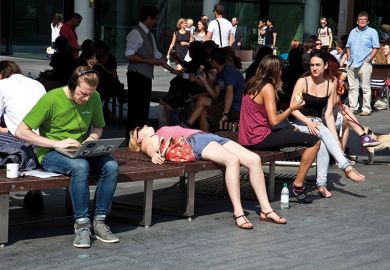From deciding that now is definitely the right time to alphabetise one’s spice rack to finally weeding the garden after about 7.5 years, the opportunities for distraction are manifold as home and office continue to be conflated. With that in mind, we asked five academics what they would advise when it came to managing one’s workload while working from home. Here are their responses:
“Block out your day so that you know how to pace yourself. If you are writing a document, try to make sure that meetings aren’t interspersed throughout the day, breaking up your concentration. Try to ensure that you have variety − activities spanning meetings, perhaps some data analysis and serious drafting. Work out what works for you in terms of the length of any block – be it by the day or the half-hour.”
Dame Athene Donald is a professor of experimental physics at Churchill College, University of Cambridge.
“Be sure to stick to ‘normal’ working times if you can. And think about your priorities − nothing is that urgent that it can’t wait.”
Kalwant Bhopal is director of the Centre for Research in Race & Education at the University of Birmingham, UK.
“Set boundaries about start and finish times, keep a to-do list every day and be realistic about how long things will take, so that you don’t get disheartened when things run over several days, weeks or months.”
Robert Macintosh is a professor of strategic management and head of the School of Social Sciences at Heriot-Watt University in Edinburgh.
“The most important way to manage oneself and one’s time in a repetitive daily routine is self-reward. I always try to reward myself. For example, setting a daily goal and trying to achieve it to ‘justify’ rewards such as an hour of Netflix or making plans with family and friends. Those rewards have become a new driving force that makes me sit at my desk again. Self-motivation is key to keeping pushing us on.”
Chang H. Kim is a research fellow at the Cairns Institute, Australia. He serves as an executive director of the Korean Association of Human Resource Development in South Korea.
“I found I had to be prepared to let some stuff go. There was a pile of writing I wanted to get finished this year, invitations I wanted to accept and strategic projects I wanted to initiate or complete. But I found that everyone was very understanding when I said to them that something just didn’t get done because…Covid. Be kind to yourself and be realistic about this being a time when the ‘must have’ trumps the ‘good to have’.”
Cath Ellis is associate dean (education) in the Faculty of Arts and Social Sciences at UNSW Sydney.




